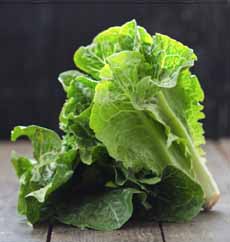TIP OF THE DAY: Romaine & Other Food Recalls
 [1] The most popular romaine dish: Caesar salad (photo courtesy Safe Eggs).
|
Recently, Santa Barbara County recalled romaine harvested between November 27th through 30th due to an E. coli outbreak. Almost instantly, every leaf of romaine disappeared [hopefully] from store shelves and restaurant menus. The public was warned not to purchase or consume romaine lettuce if its growing locale was unknown. Into the bin went whole heads, hearts of romaine, and bags of pre-cut lettuce and salad mixes that contain romaine, including baby romaine, spring mix and Caesar salad. Further instructions were to wash and sanitize drawers or shelves in refrigerators where romaine was stored. (Here’s how to clean your fridge after a food recall.) E. coli (Escherichia coli) are bacteria that live in the intestines of healthy humans and animals. Most varieties are harmless or cause relatively brief diarrhea. There are some particularly harmful strains that can cause severe abdominal cramps, bloody diarrhea and vomiting. People may be exposed to E. coli from contaminated water or food. Raw vegetables and undercooked ground beef are two of the most impacted foods. Healthy adults usually recover from E. coli within a week, but young children and older adults have a greater risk of developing a life-threatening form of kidney failure called hemolytic uremic syndrome. Produce and water get E. coli from manure; most typically, from dairy cow manure. That’s because in some agricultural areas, dairy farms exist in the same region as produce fields. |
|
|
E. coli in the manure sinks into the water tables, or blows from dry manure into the growing fields. The November outbreak occurred in three identified counties of the Central Coastal growing regions of northern and central California. Romaine grown elsewhere was not affected. “Safe” romaine includes the desert growing region near Yuma, Arizona; the California desert growing region near Imperial County and Riverside County; the state of Florida; and Mexico. For beef, the problem occurs in the processing plant. Microscopic amounts of E. coli from the intestines of cattle carcasses can come into contact with beef that is then ground. When beef is cooked, the heat kills any bacteria on the outsides of the meat. Ground beef is different, in that it has many interior surfaces that may have had exposure to bacteria, but are not exposed to the flame that kills any E. coli. That’s we are urged to cook ground beef to medium. It’s also why we should use separate cutting boards and utensils for raw beef and other meats. Note: Don’t rinse off meat prior to cooking. It just spreads bacteria over the sink and anything in the sink. We had consumed a romaine salad—one of our typical lunch choices—the day before the November outbreak was announced. It was also announced that our place of residence, the state of New York, was one of the top E. coli locations. Thankfully, we were not affected. But after the most recent outbreak, some romaine lettuce products are now labeled with a harvest region. At least then, if an outbreak is called in Santa Barbara, romaine from other areas can be safely consumed. We hope that all growers will do this. It will save consumers an unpleasant illness, and will also save millions of dollars of discarded produce. |
||


